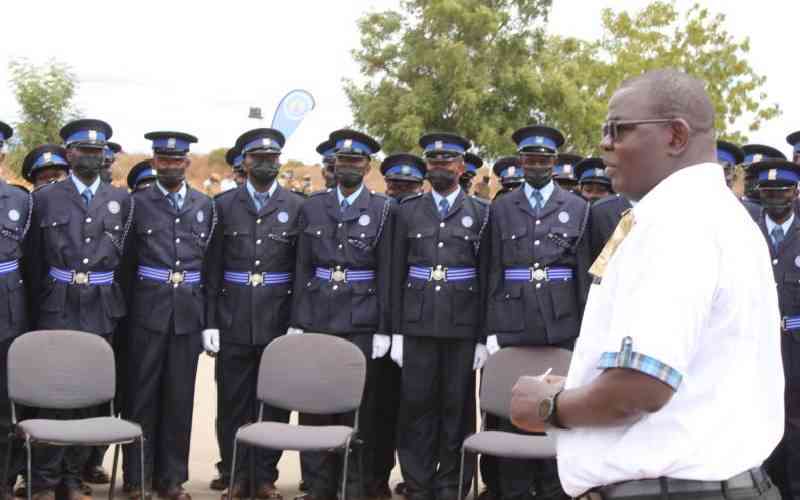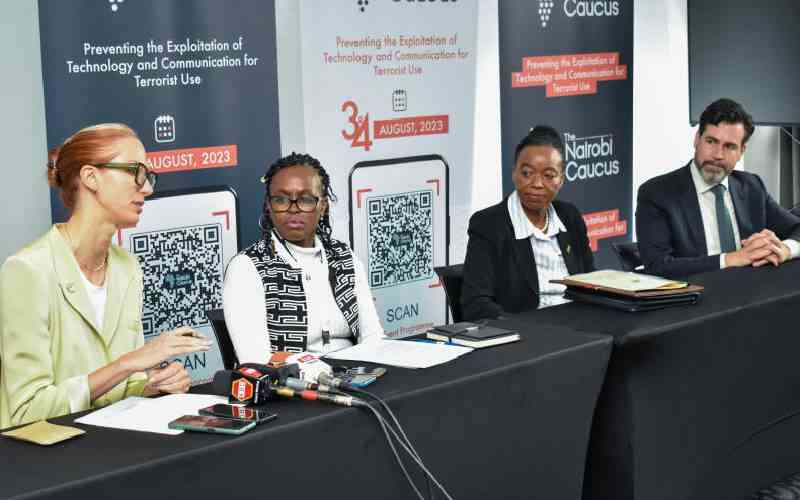NAIROBI, KENYA: A new research report paper is calling on government security agencies to review its counter-terrorism measures that may increase the problem or youth radicalisation in the country.
The report by the Institute of Security Studies released Wednesday in Nairobi said the certain tactics used in the war against terrorism are undermining the efforts to stem the tide of people joining criminal groups like Al Shabaab.
ISS Senior Researcher Dr Anneli Botha claimed that many youths join outlawed groups like Al Shabaab partly as a reaction to the collective punishment of their communities during counter-terrorism operations.
“It is clear from the research that strategies based on mass arrests and racial profiling are counterproductive and may drive individuals to extremism. Unless government changes its approach, there is a real risk it will inspire a new cycle of radicalisation and violence,” she said.
The independent academic research led by Botha included interviews with 95 people associated with al-Shabaab, 45 associated with the Mombasa Republican Council (MRC), and relatives of people associated with the organisations.
The research is one of the few that has delved into why young men join outlawed and criminal groups like al-Shabaab.
On his part, Deputy Secretary General of the Supreme Council of Kenya Muslims Hassan Ole Naado called on the government to take a hard look into its counter-terrorism strategy and tactics with a view to reviewing them.
“The security agencies should work together with local communities in fighting terrorism but some tactics such as collective punishment and profiling are counterproductive in the long-term,” he said during the launch of the report.
During the study, most al-Shabaab and MRC respondents said what pushed them to finally join radical organisations were injustices at the hands of Kenyan security forces, and ‘collective punishment’.
“Lashing out against the collective is ineffective and counterproductive, and a real danger exists it will drive individuals to extremism,” Botha says.
The single most important factor that drove respondents to join al-Shabaab, according to 65% of respondents, was government’s counter-terrorism strategy.
The research showed that certain sections of the population in Kenya feel discriminated against, while nearly half of al-Shabaab respondents (49%) identified the government as the source of the threat to their way of life and faith.
Botha said. “Government needs to create the necessary space for the expression of political frustrations other than through violence.”
The research found no direct link between poverty and the reason why respondents joined al-Shabaab and the MRC. More than half of respondents joined al-Shabaab and the MRC between the ages of 10 and 24.
Nearly all al-Shabaab (96%) and MRC (87%) respondents said they had high levels of frustration when they joined the organisations, illustrating the role emotions play in the radicalisation process.
Stay informed. Subscribe to our newsletter
Economics were a much larger factor in recruitment to al-Shabaab in Somalia, where researchers interviewed 88 former fighters in Mogadishu in April 2014, in a separate study by the ISS and Finn Church Aid, which used the same methodology as for the Kenya research.
 The Standard Group Plc is a
multi-media organization with investments in media platforms spanning newspaper
print operations, television, radio broadcasting, digital and online services. The
Standard Group is recognized as a leading multi-media house in Kenya with a key
influence in matters of national and international interest.
The Standard Group Plc is a
multi-media organization with investments in media platforms spanning newspaper
print operations, television, radio broadcasting, digital and online services. The
Standard Group is recognized as a leading multi-media house in Kenya with a key
influence in matters of national and international interest.
 The Standard Group Plc is a
multi-media organization with investments in media platforms spanning newspaper
print operations, television, radio broadcasting, digital and online services. The
Standard Group is recognized as a leading multi-media house in Kenya with a key
influence in matters of national and international interest.
The Standard Group Plc is a
multi-media organization with investments in media platforms spanning newspaper
print operations, television, radio broadcasting, digital and online services. The
Standard Group is recognized as a leading multi-media house in Kenya with a key
influence in matters of national and international interest.








